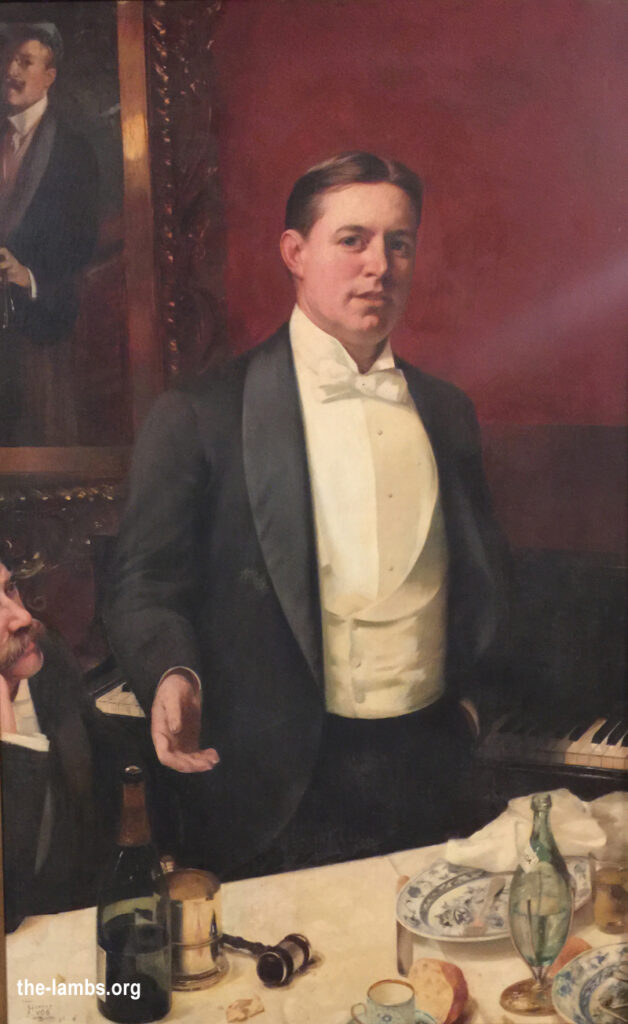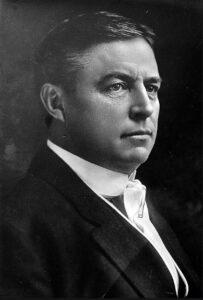Augustus Thomas (8 January 1857 – 12 August 1934) was a Missouri-born playwright, a champion for social justice in the theatre, outspoken pundit, and a member of The Lambs for nearly 50 years. He was elected to The Lambs in 1889, served as Boy for seven terms, and Shepherd 1907-1910. Thomas is credited with brokering the end of the Actors Strike of 1919. He is an Immortal Lamb.
Augustus Thomas was a Renaissance man. His friends called him Gus, the world called him the Dean of American playwrights. Between 1875 and 1921 he wrote more than 60 plays, hardly a season passed without the opening of a play or two by Thomas. His plays were more than copies of European models and were hammered out with vigorous American themes, settings, and characters. To read his autobiography, The Print of My Remembrance, is to share in the excitement of the American drama bursting forth upon the stage of national and even international importance. Before his career as a playwright, he was by turns a pageboy in the Missouri legislature and in the United States Congress, a student of law, a newspaper reporter, an illustrator, an amateur boxer, a railroad brakeman, a box office manager, an actor, stage director, a manager, and a passionate union organizer.
Thomas was born January 8, 1857 in the outskirts of St. Louis, Missouri. He said later he vividly remembers the morning in 1865 hearing the news that President Lincoln had been shot. He was educated in St. Louis public schools, and he recalled the air off the Mississippi and seeing sidewheel floating palaces and riverboats plying the big river. As a boy his father’s connections got him a job as a legislature page and he met scores of famous politicians of the Reconstruction Era, the start of experiences that would be later turned into plays. He worked as a railroad clerk and dabbled in poetry, painting and drama. He acted in amateur productions, wrote a few plays and even tried being a theatre manager. He graduated from Washington University in St. Louis.
He tried the law but show business drew him in. At the time he was working for the St. Louis Post-Dispatch, which he quit at age 31, to hit out for New York. He left his wife in Missouri because he could not afford to bring her East. In the summer of 1889 he was in Manhattan, unemployed and looking for his big break. This came when two young managers, William G. Smith and Charles Matthews, agreed to produce his play. The Burglar, starring the legendary Maurice Barrymore in the leading role, was a smash hit. Barrymore was a favorite leading man at the time and was regarded as one of the most handsome men on the planet, a man’s man and a ladies man. Barrymore took an instant liking to Thomas and they had a shared love of boxing. They became fast friends. Barrymore, also a Lambs member, would star in that play and five more plays by Thomas.
The show’s manager was another future Shepherd of The Lambs, actor-producer Joseph R. Grismer. To the amazement of Thomas, Grismer said to the playwright, “Why my boy, it’ll make a fortune for everybody!” Grismer made a fortune, running three road companies simultaneously, but Thomas had sold his shares for a mere $2,500.

Thomas was elected to The Lambs in 1889 and the following year was asked to join the Council. From 1892-1898 he served as Boy under Shepherd Clay M. Greene, another playwright of note, and they held the positions for seven terms. Under them the Gambols began and the club moved into permanent quarters in Herald Square. He served as Shepherd from 1907-1910; his Shepherd’s portrait, by Hubert Vos, is one of the most splendid in the Lambs’ clubhouse. Thomas, in white tie and tails, is standing over a dinner table, arm outstretched in greeting.
Thomas was deeply proud to join the Club. He wrote, “I had now become a member of The Lambs,” he said, “At the clubhouse I passed more than half the time I permitted myself away from my writing. The Lambs was then in its fifteenth year, and contained the best element in the profession. It was a great honor, privilege, and education to be received on equal terms by its then membership, a total professional number of 100, which included such men as Lester Wallack, Dion Bouciault, Steele MacKaye, Mark Smith, Robert G. Ingersoll, Otis Skinner, the Holland brothers George, Edmund and Joseph, and others worthy of the standard that these names indicate.”
In 1891 he completed his first blockbuster hit, the magnolia-scented play set in the South, Alabama. Many of the Lambs adopted Southern dialects to appear in the drama. Critics and audiences now recognized that he was no ordinary talent. In Alabama, recorded by some critics as the first American pastoral play, this led to more productions set in America such as In Mizzoura, Colonel George of Mt. Vernon, Arizona, Colorado, The Hoosier Doctor, The Rio Grande and The Copperhead.
Thomas was a perfect Shepherd because he knew what it was like to be a traveling actor and a struggling playwright. In his autobiography, he recalls about the night he arrived in Chicago on a tour and setting about in the rain in search of a hotel room. He inquired at the desk,
“What is the rate for room and board?”
“Three dollars,” answered the clerk.
“What is your professional rate for actors?” he asked.
“$3.50,” replied the clerk, looking over his head into space.
By the end of the 1880s, Madison Square at Broadway and Twenty-third Street replaced Union Square as the theatrical center of the city. Under Shepard Lester Wallack, the club kept pace at its new home at 34 W. 26th Street, the first clubhouse under Lambs‘s control. This kept the club in the middle of the action and provided a more clear identity than it had previously known. It was the scene of dinners and social occasions. In his autobiography Thomas wrote that the men were like members of a family at the weekly dinners:
There was a notable musical contingent and often between courses the popular songs of the time. The gayety of such youngsters as Harry Woodruff, Cyril Scott, Fritz Williams, Francis Carlisle, and Ned Bell was as memorable as the wise talk of such elders as Steele MacKay and Frank Mayo. Fun was spontaneous and unconstrained. The membership was capped 200 and nearly full, with an initiation fee of $100 and dues of $25. By contrast, the fees for The Lotos and the Authors’ Club were more than double.
Little escaped his curiosity. Thomas studied hypnotism, and his biggest hit, The Witching Hour, deals with the fad. He read everything from the Bible to Shakespeare, from Washington Irving to Voltaire.
“Censorship is wrong in principle,” he wrote. “Nobody who knows anything wants it. It is a sectarian Puritanical idea, and it grows out of fanaticism.” From these deeply held beliefs sprang his stand against Prohibition, about which he wrote, “If anything is written of me after my death, I hope this will be included that I was always against the Prohibition amendment always… The 18th Amendment is the most un-American, the most destructive thing that was ever written into the statutes.”
In a time when the nation practiced an unexamined anti-Semitism, he introduced a sympathetic Jewish character in As a Man Thinks. “I knew a Jewish doctor who was giving a great deal of his time to the care of crippled children, and doing it with an unselfishness and a lack of advertising that made it admirable,” he wrote. “I thought it would be acceptable to the public to see a Jew put in that position prominently instead of having him ridiculed as he generally was in the theatre.” Thomas was outspoken in his condemnation of anti-Semitism. “I share none of the hostility that many do to the dominant management in American theatre because it is Jewish. I felt then [in 1911] when I wrote As a Man Thinks, and I have said more than once in public since, that the Jews were in control of American theater because they deserve to be.”
Thomas was president of the Society of American Dramatists from 1906 to 1911. He was a member of the Producing Managers Association and he took the lead role in ending the Actors Strike of 1919. He campaigned for an American national theater and a national conservancy for dramatic arts. Among his friends were William Jennings Bryant and Woodrow Wilson.
Thomas was elected to the American Academy of Arts and Letters and the National Institute of Arts and Letters. He served as president of the latter from 1914 to 1916 and was awarded it’s gold medal for his life’s work in drama. In retirement he moved to a country club in Nyack, New York. On August 16, 1934 at age 77 he succumbed to a heart attack with his wife beside him. Hundreds attended his funeral at Saint George’s Episcopal Church in New York. His remains were returned to St. Louis and interred in an unmarked grave in Bellefontaine Cemetery.
